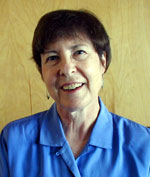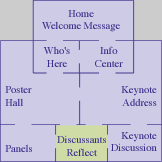 Judith Warren Little Judith Warren Little |
I have come to this conference fresh from a research project that explores the relationships among teacher community, teacher learning, and reform in high schools, with emphasis on mathematics and English. That project involves much smaller-scale systems, examined from a more "micro" perspective. Iím appreciative of the new insights offered by this conference, with its larger scope. I offer three sets of comments here, all with implications for sustainability. The first set focuses on how the conference illuminates the difficulty of systemic change, but also makes the "system" come alive in complicated and interesting ways that could stimulate new strategic thinking. The second acknowledges how the projects and the conference discussions have contributed to an understanding of teacher leadership in pursuit of reforms in subject teaching. The last set reflects on the part played by teacher community in the progress of these reforms, and urges even more attention to this element of a systemic change strategy.
|
Subjects and the "system." Iím impressed by the sheer magnitude of the task that these projects have undertaken. While "systemic reform" strategies have been conceived as a means of getting reform to take root and go to scale (an optimistic premise), the picture emerging in the conference is far more mixed (elements of optimism and pessimism). I found myself trying to sort out what new insights about "system" and "systemic relationships" emerge when you see them through the lens of a particular subject and subject-specific reforms (in this conference, science and mathematics). Michael Fullanís keynote and resource paper portray a change model built around institutional levels (state, district, school, classroom). What does "systemic" look like when mapped from a subject reform perspective?
First, the system starts looking less rational, more political, more shaped by a topology of crucial moments in time (textbook adoption cycles, for example), and more differentiated by where you sit in it (elementary vs. high school, for example). Institutional levels like "state" or "district" start looking less monolithic and more complicatedówithin each level, people may hold different and often competing views of "good teaching" in math or science. Different levels loom "bigger" or "smaller" in each of the local pictures. The system map also gets more complicated and more interesting as one adds other relevant organizations or groups. Had NCTM not pursued its own systemic strategy as a professional organization beginning many years ago, the tales told by the math projects in this conference would likely be very different. Had parent groups not organized in support or in opposition, the story in some local communities would have been different as well.
Second, the history of these subject projects shows how systemic strategies may be aided or thwarted by long-standing culture. Some posters in particular helped me to separate out the CURRENT POLICY compatibility between state policy and local initiatives (for example, whether state policy is compatible with NCTM standards) from the HISTORY OR TRADITIONS in a subject or in a local community of teachers. The history is rarely given as much attention as the current level of policy "alignment" or "conflict," but probably does more to explain how teachers, principals, district administrators, and parents think about the subject and subject reform.
Finally, the word "system" tends to convey a very stable or even static feel, but many posters contain vivid accounts of instability in the system: teacher and administrator turnover, fluctuating levels of organizational support, shifting district politics and state policy. Iím struck by the irony of having projects that are designed, organized and led by people who have substantial subject teaching expertise in math and science (and thus have a great deal to offer in the improvement of teaching and learning), but who spend much of their time negotiating the shifting sands of the "system" contexts they work in.
Lessons about teacher leadership. These projects contribute a great deal to our understanding of how teacher leadership has developed in the context of subject reforms and the conditions that support or impede teacher leaders in pursuing systemic change. In nearly all cases, teacher leaders help solve a problem of scale by expanding a projectís professional development resourcesóthey conduct workshops and consult with individual teachers. Although these workshop leaders may have to confront participants who are resistant to the project ideas, their principal responsibilities apparently lie in helping teachers to gain understanding, skill and confidence in a domain of subject teaching. The challenge is to sustain professional development by maintaining a pool of enthusiastic and well-prepared teacher leaders.
In some cases, however, the concept of teacher leadership extends beyond professional development to a much more ambitious conception of capacity building, organizational change, and cultural transformation. In the space available, the posters have not been able to elaborate much on what it has meant to envision teacher leader as change agent, but they provide some clues to important issues and questions. For example, teachers may emerge as teacher leaders mainly on the basis of their enthusiasm and active participation in a project. They are project allies, but they may bring little experience or preparation in leadership óconditions that would cause other teachers to see them as a credible leader, or would cause principals to take them seriously. There's a real question here about how someone establishes a credible warrant for leadership (and being picked by administration or by an external project is not necessarily a warrant in the eyes of other teachers!).
Each of the conceptions of teacher leadership entails problems of selection, preparation, and long-term support. The more ambitious the conception, the more complicated the problems, especially problems of preparation and support. These extend to problems of preparing others in the system (including principals) to understand and make good use of teacher leadership. In my own research on school reform over the past decade, Iíve found that reform initiatives tend to depend heavily on teacher leadership, but have little success in securing long-term institutional support. One contribution of a sustainability conference (and ongoing conversation) will be to get much clearer about the possibilities and limitations of a strategy built on teacher leadership.
Capitalizing on teacher community. One of the interesting refrains in the conference is "starting over." That is, faced with high rates of teacher turnover, many projects find themselves in a Sorcererís Apprentice mode, introducing the same ideas and methods over and over to changing cohorts of teachers. Another common refrain centers on "pockets of resistance," some of them with a high degree of organization and collective force. Both of these refrains underscore the long-term strategic power of going for cultural change and teacher community as resources for sustainability. The posters help illuminate some of the issues in going down that path.
First, there are trade-offs in the use of project resources. Many projects have invested in outreach to multiple levels and sites (district and school, for example) and in reaching as many individual teachers as possible(number of teachers trained, range of professional development opportunities offered). There are good reasons for wanting to establish a broad reach, but one built around individuals has fewer prospects for building community (sustainability) than one built around recruiting teams or groups who will have some sustained contact with each other and who can help reduce the costs of teacher turnover.
Second, a community-building strategy has implications for the design and organization of professional development. Perhaps less reliance on discrete professional development events, and more effort to build local self-sustaining networks (I expect Ann Lieberman may address this). Less demonstration, more investigation perhaps. For example, several projects have begun to experiment with the support of study groups and with introducing practices based on Japanese Lesson Study. As the posters attest, thereís not much of a precedent for fully developed Lesson Study in the U.S.. It will take time and effort to introduce as a habit and resource of teacher community and teacher learning. Somewhat more developed are practices for engaging groups of teachers in looking together at student work in particular subject domains (usually math, sometimes science or literacy) as a way to understand childrenís learning and develop teaching practice. Introduced as a practice in schools, rather than only in occasional professional development events, they might contribute to sustainability of subject reforms.
Third, capitalizing on teacher community could mean working differently with existing leaders in schools. The posters speak consistently and forcefully about the importance of school principals, and clearly that has been a crucial discovery (though the implications are different at elementary, middle and high school). The posters draw less attention to teachers who occupy formal leadership positions in schools (like department chairs) and those informally recognized as influential teachers. Together, and for good or ill, these are the culture bearers.
Iíll finish where I startedóthis has been a terrifically generative conference. I learned a lot, and best of all, Iím left with lots of interesting questions and practical possibilities to consider.
|


